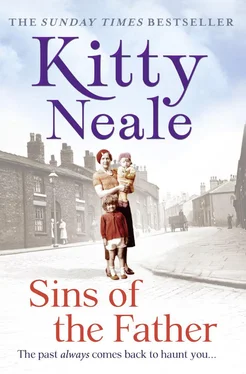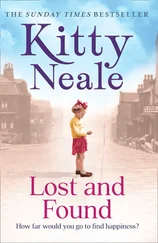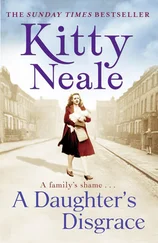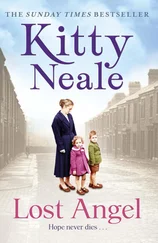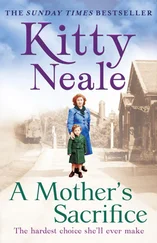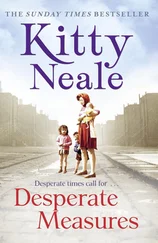1 ...6 7 8 10 11 12 ...21 When the kids got up, chaos reigned. As though to show their displeasure at this change of routine, all except Luke played up. Susan said she felt ill, but when Emma felt her forehead, there was no sign of a fever. Used to Susan’s wily ways to get out of school, Emma ignored her whines as she encouraged them to dress, sad that despite her best efforts they still looked like a band of ragamuffins.
She made the porridge, handing each of them a bowl, but when Susan sat on the floor, taking her first mouthful, she grimaced. ‘It’s horrible, Em. Ain’t we got any sugar left?’
‘No. You had the last of the sugar that Alice gave us yesterday.’
‘I can’t eat it without sugar.’
‘Then you’ll go hungry,’ Emma said impatiently.
Susan pouted, took a few more mouthfuls, but abandoned the rest. The others ate without complaint, and at last they were ready for school.
‘Now then,’ Emma said firmly, ‘off you go. I’ll be looking for a job today and may not be here when you come home from school. If that’s the case you all know what you have to do.’
‘Don’t worry. I’ll look after them,’ Luke said.
‘I know you will,’ Emma said, smiling at her brother, ‘but don’t forget what I said. Don’t try to light the fire. I’ll do it when I come home.’
Luke nodded, but as Emma looked at the girls she saw the confusion and uncertainty in their eyes. Remembering her determination to turn over a new leaf, she hugged them one by one, saying reassuringly, ‘You’ll be fine with Luke and…and I’ll see you later. Be good at school,’ she added as they reluctantly shuffled off.
The door had hardly closed when Emma heard her father coming down the ladder. He scratched his head, then a fit of coughing racked his body.
‘I don’t suppose there’s any tea going?’ he croaked.
‘Since when have we had money for tea? I used to dry nettles for Mum, but you never drank it.’
‘I can’t stand the stuff.’
Emma said nothing. She hated talking to her father and avoided it as much as possible. Instead of sitting down he went to the sink, gulping down a mug of water before sluicing more over his head. Emma left him to it, climbing the stairs to the loft again.
She needed to get ready, and hoped the clothes she had sorted out the night before would be all right. She’d carefully ironed a blouse, but the pattern had almost faded, the material worn thin. The skirt wasn’t too bad, though you could see a line where the hem had been taken down, which no amount of ironing could hide. She had no stockings, but hoped nobody would notice, and lifting her hand to touch her hair, wished she had something to pin it up. It felt stiff, lank, but without soap she’d only been able to rinse it with cold water. Pulling at the tangles with her fingers, she did the best she could, then returned downstairs.
The room was empty, her father gone, no doubt late for work again. This was a common occurrence and he was always getting the sack, now travelling to a building site in Chelsea after losing a job that had been just round the corner.
Oh, she didn’t want to think about him. Today was a new beginning for her, and after a swift look to check that the fire had been doused, Emma hurried out, running down the stairs with her heart full of hope as she headed for the nearest row of shops.
Later that day, Emma was trudging to the market, footsore and near to tears. When she thought about the reception she’d received, her cheeks reddened with humiliation. She’d gone into a dress shop in Falcon Road first, her eyes lighting up when she saw the lovely garments hanging on rails. There were pretty pastel dresses, nipped in at the waist with matching belts, and she itched to touch them, to feel the material, but had resisted, going up to the counter wide-eyed with eagerness to ask if they had any vacancies.
‘Miss Fisher,’ the young and very smart girl behind the counter had called.
‘Yes, can I help you?’ a slim, middle-aged and sophisticated woman asked as she came out from a back room.
‘I…I’m looking for work,’ Emma stammered.
‘I’m sorry, but we already have a cleaner.’
In her innocence, Emma had smiled, ‘Oh, no, I haven’t come for a cleaning job. I’d like to work in the shop.’
‘You must be joking,’ Miss Fisher said, eyebrows rising haughtily as she eyed Emma up and down. ‘We have very high standards here, and I could hardly offer you employment looking like that.’
Emma had seen the smirk on the young sales assistant’s face, and flushed, but, fighting to hide her humiliation, she’d kept her head up. ‘Fine, I wouldn’t want to work here anyway.’ And on that note she’d turned on her heels, shutting the door firmly behind her.
Blimey, what a couple of snobs, Emma decided as she’d walked away, refusing to let this encounter stop her. Yet by the time she had tried a few other garment shops the penny had well and truly dropped. Compared to all the sales assistants’ attire, her clothes looked awful, scruffy. No wonder they wouldn’t employ her. She’d tried a grocer, a baker, a haberdashery shop, but she’d received the same reception time and again.
The colourful stalls failed to lift Emma’s spirits as she reached the market. It was buzzing with noise and several traders raised their hands to wave at her.
‘Watcha, gorgeous,’ called one. ‘If I wasn’t a married man I’d come out from behind me stall to give you a smacker.’
Emma forced a smile, but it failed to reach her eyes. She didn’t look gorgeous. She looked a mess.
‘What’s up, Em?’ Dick asked as she approached his stall. ‘You look a bit down in the mouth.’
‘I’m too scruffy to get a job in a shop,’ she told him.
‘You look fine to me.’
‘Don’t look so downhearted, girl,’ Charlie, the stall-holder, consoled, and, holding out a mug, he added, ‘Here, you can have me tea. It’ll buck you up no end.’
Emma gratefully took the mug, the strong tea tasting like nectar as she gulped it down. It did make her feel better, invigorated, but she still had no idea where to try next for a job. ‘Thanks, Charlie,’ she said, handing him the empty mug.
Charlie Roper was a nice man, but showing his age now, his gnarled fingers gripping the mug. ‘Try the factories, love. There’s Tate and Lyle’s round the corner, for a start.’
She lowered her eyes. She didn’t want to work in a factory, but there didn’t seem to be any choice. ‘Yes, I’ll do that.’
As customers approached the stall, she called a quick goodbye before moving away.
At four o’clock, Emma was on her way home, her cheeks burning at the memories. Even the factories had turned her down, saying there weren’t any vacancies for unskilled workers, but at least this time she believed them, believed that her appearance hadn’t made any difference. She’d been led through countless factory floors to foremen’s offices, seen women working on machines, their hair in turbans and clothes covered by overalls. Sometimes the noise was deafening and she wondered how they put up with it, but by this time she would have taken anything.
Emma was still brooding when she finally reached her street. It was treeless, grey and dingy, but she was used to the scenery. A few children were playing marbles in the gutter, and a couple of little girls were arguing over a skipping rope made from an old clothes line. Emma hardly noticed. She went into the dilapidated house where she lived and climbed the stairs wearily to the attic.
As she walked into the room the children clambered around her. ‘Did you get a job, Em?’ ‘Where will you be working?’ ‘Will you be earning lots of money?’
Impatiently brushing them aside, Emma looked around and her temper flared. ‘Look at the state of this place. You were supposed to do your jobs, but this room hasn’t been touched.’
Читать дальше
